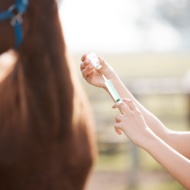A ban is due to come into effect next year.
Animal welfare organisations are calling for the Government to commit to banning the use of remote-controlled electric shock collars on cats and dogs in England, amid growing fears of another U-turn on animal welfare legislation.
The Department for Environment, Food and Rural Affairs (Defra) announced in April that a ban on shock collars would come into force on 1 February 2024. However, the RSPC, The Kennel Club and the British Veterinary Association (BVA) are worried that no date has yet been set for the final stage of the legislation to be passed through Parliament.
After the proposed Kept Animals Bill was dropped earlier this year, there are growing worries that the shock collar ban will suffer a similar fate.
The BVA has created a template letter for veterinary professionals to download and send to their local MP. Similarly, the RSPCA has launched a campaign to encourage supporters to email their MP in support of the ban and put pressure on the Government.
Esme Wheeler, an RSPCA dog welfare expert, said: “The ban has stalled with no progress for seven weeks, leaving many in the animal welfare sector fearing the UK Government will make a u-turn.
“The public must now make their voices heard and ensure this UK Government keeps its promises and outlaws the use of these cruel devices in England, once and for all. ”
The move to ban shock collars has widespread public support. New data released by The Kennel Club revealed that 77 per cent of the public want to see the devices banned.
Mark Beazley, The Kennel Club’s chief executive, said: “Research has shown there is absolutely no need for cruel shock collars, which cause physical and psychological harm, given the vast array of positive training methods available.
“We urge the Government to keep its promise and ban these devices as a priority.”
In response, the Government has reiterated its commitment to banning shock collars.
A Defra spokesperson said: “The UK is a world leader in animal welfare and we are committed to introducing a ban on hand-controlled training collars that can deliver an electric shock to cats or dogs.
“This new law will protect cats and dogs from these harmful devices which can be all too easily open to abuse and represents an important step in our commitment to animal welfare. Parliamentary business will be announced in due course.”
A ban is already in place in Wales and Scotland’s Animal Welfare Commission has recommended a complete ban in Scotland.
Image (C) Shutterstock



 Zoetis UK has apologised for a supply shortage of Equip Artervac, caused by a manufacturing issue.
Zoetis UK has apologised for a supply shortage of Equip Artervac, caused by a manufacturing issue.